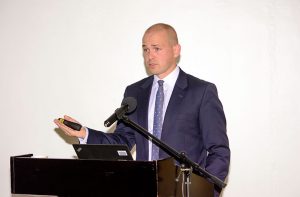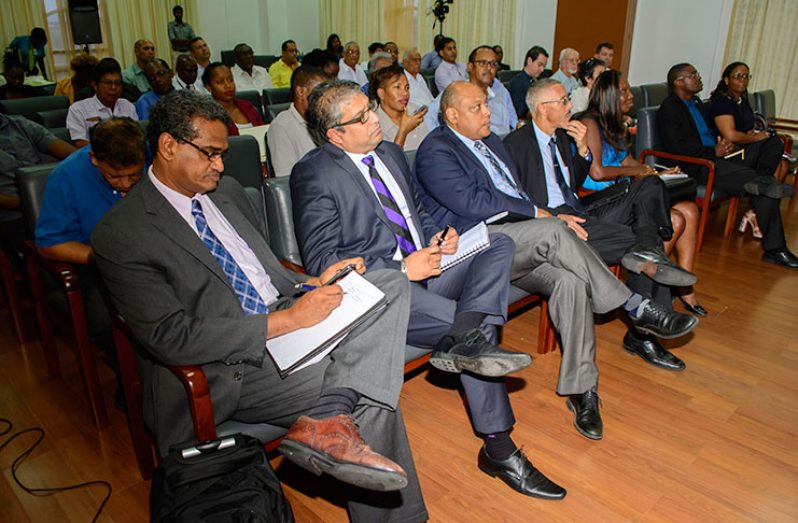While the discovery of oil in Guyana is a huge development, Director of Oil and Gas Services with UK based company Ernst and Young (EY) Global, Chris Pateman-Jones, warned against the ‘Dutch disease’.The oil and gas expert made these comments on Monday during a presentation hosted by the Ministry of Natural Resources. The event was attended by members of the Private Sector and was geared at enlightening them about both benefits that can be derived from the industry, as well as likely negative effects.
Pateman-Jones in his presentation cautioned that Guyana needs to think about the long term viability of the industry as it ventures into new territory. US oil giant ExxonMobil had announced in June that its ‘Liza’ well offshore Guyana contains hydrocarbon reserves in the range of 800 million to 1.4 billion equivalent barrels of crude oil, describing it as a “world-class discovery.”
The Liza wells are located in the Stabroek Block approximately 120 miles (193 kilometres) offshore Guyana. As such, Pateman-Jones made it clear that while there are many positives associated with the oil find, there are also some negatives. He cited the ‘Dutch Disease’ as one of the possible negative effects of the oil discovery. ‘Dutch Disease’ refers to the negative impact on an economy, which results in the economic development of a specific sector (in this case, oil and gas) and the decline in other sectors (like manufacturing, agriculture, etc).
Notwithstanding, Pateman-Jones made it clear that economic development, diversification of the economy, attraction of international investment, protection of natural resources and the environment, increased accountability of the government, sustainable long term wealth and the opportunity for rapid economic development are positive factors for any oil producing country. He described ExxonMobil’s find as one of the largest oil discovery of 2015 but noted that the 2020 target of oil production is “pretty ambitious.”
This represents a huge development for Guyana, he said, however, in realising the opportunity, and potential it holds, he noted that the government will face a number of challenges as it seeks to develop sufficient oil and gas infrastructure to leverage its growing oil wealth to develop the country, its people and economy. Pateman-Jones believes that as Guyana’s oil wealth is offshore, consideration should be given to developing an onshore supply base. He said thought must be put into how to generate and retain local value from exploitation of reserves.
“Developing an onshore base is a proven route to secure local benefit and if planned well, can lead to a multiplier effect on other national development initiatives,” he said. Those other initiatives include maintenance, fabrication, technology and engineering services, transport management and logistics, customs, licensing, waste management, port management and shipping along with spares handling, materials management and tracking.
The consultant, who recently established an office here in Guyana, used Brazil and Norway as two examples of how to manage oil production. According to him, there are several key considerations to be examined keenly, namely the country’s local capability and retained benefit.
“How do you ensure investment supports development and retention of economic value in the local economy and that sufficient capability is developed within the local work force to serve increasing needs for skilled workers?” he said.
Additionally, Pateman-Jones said in the selection of a location which best suits the geography of existing and future infrastructure and the offshore locations, the base aims to serve is also important. “The location must be agreed collectively with the local population,” he added.
Accordingly, he noted the need for funding and attracting the right investors. “How to best secure investment to fund development of the onshore base and on what terms?” he asked rhetorically. Infrastructural investment into the supply base must balance both the immediate and future needs for growth across the diversified economy. Essentially, the consultant said Infrastructure investment needs to be properly aligned, while stressing the need for a strategic plan.

Meanwhile, Former Deputy British High Commissioner to Malawi, Kirk Hollingsworth said his concern lies with ExxonMobil operating out of Chaguaramas, Trinidad to service the Liza wells, a journey he said estimates approximately 40 hours from Trinidad. On the other hand, Hollingsworth noted that the journey from Guyana would be 13 hours.
“In terms of looking at the logistics of this, it is far more straightforward in terms of getting local employment and Guyanese realising the benefit of oil and gas to have some sort of base here that could service Exxon’s Liza wells. Moreover the industrial facility will take a few years to complete and in the meantime it is millions of dollars. Guyana has lost out more than half a billion dollars to date in terms of servicing the wells,” he stated.
He raised issue with the use of Norway as a model noting that the conditions in that country do not exist here. “Norway was heavily capitalized, perhaps excessively bureaucratized, as well as regulatory wise- the Norwegian government insisted that 60 per cent in any production facility remains with the government. Companies were buying shares etc. Secondly, I believe with the Norway model, Norway was already heavily industrialised, which facilitated the rapid development of the oil and gas industry. None of these conditions exist in Guyana- the comparison has severe limitations,” the former Deputy British High Commissioner stated.
However, in response Pateman-Jones made it clear that while Norway was heavily industrialised, that was only south of the country. He said the country was used as a model because it had a very clear strategy of what it wanted to do and they have not moved away from that. “You have to be sensible by trying to figure out how to avoid being in a situation that a lot of countries are in—oil and gas revenue cycle,” he added.
Meanwhile, Anthony Paul, Advisor to the Ministry on oil and Gas- referenced Ghana and noted that legislation and tax regime did not give that country’s government a lot of revenue in the early phases. He stressed that it is important to pace the development and decide when they come on stream.
“There are options and you have to make tradeoffs…you have to understand those tradeoffs and make decisions and that’s what governments need to do. If you are going to trust governments to make tradeoffs how do we satisfy ourselves as citizens that they are making it the right way-with our interest at heart—they can justify in some way why they made those trade offs,” Paul posited.
Michael Correira, a local businessman, questioned the logic behind ensuring there are oil and gas jobs here as opposed to trying to focus more on the revenue side of the negotiation. “Should we be following the models of other countries or should we try to do it differently? Why aren’t we putting negotiations towards the revenue side? Why are we holding on to try to force Guyana to become a country that is oil and gas country with technical expertise facilities?” he asked.
Pateman-Jones in response said reference to jobs relative to an onshore base is not restricted to oil and gas jobs. He said the key is trying to develop a world-class industry, noting that lots of those shills are not oil and gas specific.
Another businessman, Ifa Kamau Cush said he is in favour of the Norwegian model as it demonstrates that as a country there is a need to enter into the process with a sense of “urgency, vision and political will.” “As a country we need to negotiate with Exxon, interact with Exxon, in a process that lets them understand that they are not the only players in town; there are other oil companies and we are not prepared to compromise,” he said. Cush added that the concern about experience and expertise in Guyana is not one that persons should be anxious about, as experience can be bought. “We need to move forward with a sense of urgency, political will,” he stated.
Meanwhile, in brief remarks, Minister of Natural Resources, Raphael Trotman said it is not uncommon for persons, organisations or groups to have concerns about the oil and gas industry. “I know there are concerns, there are concerns at the level of Government, the Private Sector and throughout. I believe the people of Guyana have a right to participate and must be given that right and an option to participate in an industry that is going to determine their future and be transformational…and one of which the national patrimony is going to be exploited,” he said.
The Minister said the entire process and steps toward the future will be guided by international and regional experts in the field so that Guyana can benefit. “Somewhere between going after the revenue and somewhere between the other extent of having the local content involved in the development of that revenue is where we need to place Guyanese and Guyana,” said Trotman. He said too that it is with the assistance of international firms like EY Global that Government is doing its best to stay up to date “We are relying on foreign expertise to advise us on the varying impacts and we have already drawn up a list and we are going to receive support in making that final decision,” he said.
Monday’s presentation is one in a number slated to occur over the next few weeks.




.png)









